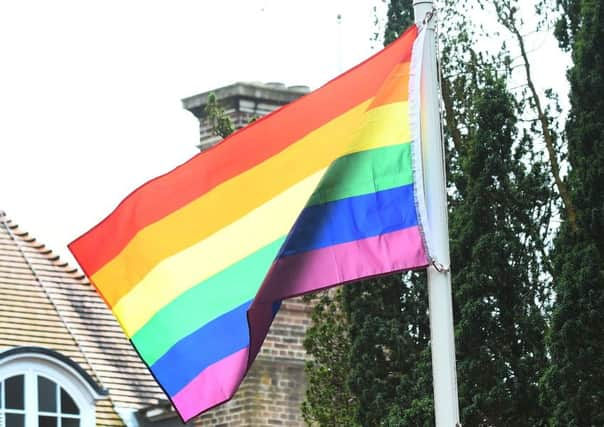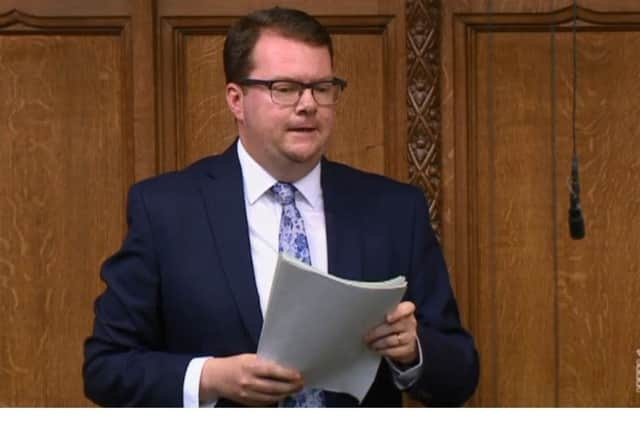Gay marriage and abortion: Momentous Commons votes see MPs back major social changes


In two constitutionally significant votes, a large majority of MPs disregarded DUP arguments about respecting the fact that both issues remain devolved matters and instead used an act of direct rule to change the law.
Both changes could still be halted if Stormont is restored by October 21 – an unlikely prospect even before tonight’s developments – and the changes have not become law by that point.
Advertisement
Hide AdAdvertisement
Hide AdHowever, although that could persuade some traditionalist DUP members to compromise on other issues such as an Irish language act in an attempt to restore Stormont, Sinn Fein is now likely to be wary about restoring Stormont before October if that scuppers reforms for which it has argued.


The changes are also significant because they indicate increased willingness by Westminster to step in and legislate in nominally devolved areas, born out of impatience at the claim devolution exists in anything but name more than two years after the Stormont Assembly last sat.
Both legal changes were passed by MPs at speed and with limited scrutiny because they came as amendments to a Northern Ireland bill being fast-tracked through Parliament by Karen Bradley.
The central purpose of the bill itself was to remove from Mrs Bradley the obligation to call an Assembly election in the absence of devolution being restored in coming weeks.
Advertisement
Hide AdAdvertisement
Hide AdLabour MP Conor McGinn, who comes from south Armagh but represents St Helen’s, saw his amendment to legalise same-sex marriage pass by 383 votes to just 73.
The amendment places a duty on the secretary of state to pass regulations to legalise same-sex marriage by October 21. However, if Stormont has been restored before the regulations have been passed, the change would not go through.
The abortion amendment from Labour MP Stella Creasy and others was more opaquely phrased. It obligates the secretary of state to make regulations to “give effect to the recommendations of the Report of the Inquiry concerning the United Kingdom of Great Britain and Northern Ireland under article 8 of the Optional Protocol to the Convention on the Elimination of All Forms of Discrimination against Women”.
It is clear that the amendment, which passed by 332 votes to 99, will see the abortion law liberalised unless Stormont returns by October.
Advertisement
Hide AdAdvertisement
Hide AdHowever, it is not entirely clear what form that new abortion legislation will take.
Strongly opposing both amendments, DUP Westminster leader Nigel Dodds said that Mr McGinn’s amendment “does drive a coach and horses through the devolution settlement”.
But Mr McGinn rejected that argument, saying that in the absence of Stormont it was right to extend the equality law throughout the UK.
Mr McGinn said that the debate had been positive, with opposing viewpoints on the sensitive issues being expressed “in an atmosphere of understanding and respect”.
Advertisement
Hide AdAdvertisement
Hide AdTonight the Presbyterian Church in Ireland expressed “disappointment and regret” at the votes and urged the government to clarify how it would consult on the “sensitive and complex” issues before changing the law.
Prior to the vote, the leader of Ireland’s Catholics, Archbishop Eamon Martin, had urged Catholics and others to lobby MPs to oppose the changes.
Both Labour and the Tories allowed their MPs a free vote on the issues as matters of conscience, as did the SNP, setting aside its traditional refusal to get involved in non-Scottish devolved votes.
DUP MP Gavin Robinson argued that if Westminster was now deciding that it should use an act of direct rule to get involved in issues such as abortion and gay marriage, then it should move towards far more direct rule, taking urgent decisions about schools and hospitals which have been piling up for more than two years.
Advertisement
Hide AdAdvertisement
Hide AdMr Dodds expressed particular concern at the proposed abortion changes, telling MPs: “On abortion there would certainly be a degree of concern among all parties in Northern Ireland about legislating; although the Northern Ireland Assembly parties across the board may take a different view on what needs to be reformed, they might not agree with Members here about the extent to which reform should happen in terms of time limits and the other aspects.”
But Ms Creasy told MPs: “I believe powerfully that we will never have true freedom if women do not have the same control over their bodies as men. If we say to women that we will force them to continue an unwanted pregnancy, they will always be second-class citizens compared with their male counterparts.
“That is exactly what we are saying to our fellow UK citizens in Northern Ireland.”
However, Peter Lynas, the Northern Ireland director of the Evangelical Alliance, said that it was a “deeply sad day”.
Advertisement
Hide AdAdvertisement
Hide AdHe said: “Unfortunately Westminster MPs have placed personal agendas ahead of the people and the peace process in Northern Ireland.
“For over 50 years Northern Ireland has chosen a different way which means 100,000 people are alive here who otherwise would not be.
“It would be a tragedy if today has changed that.”